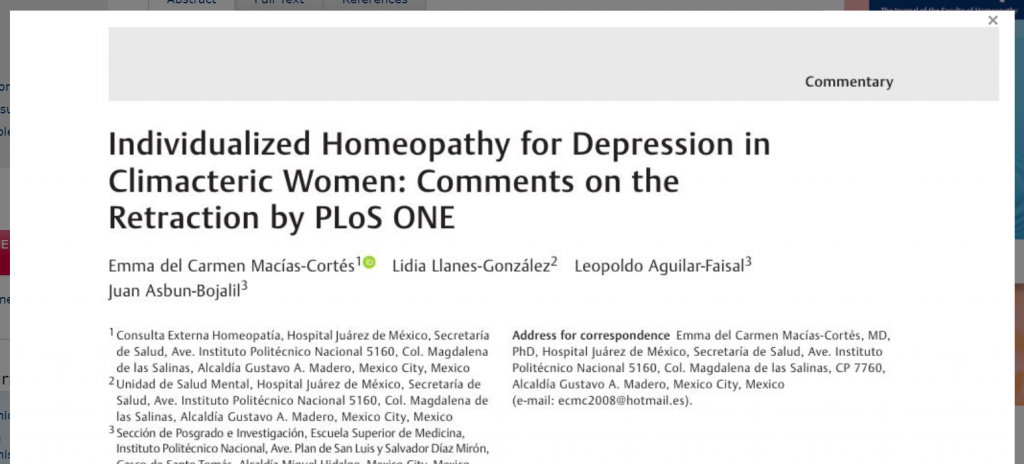
A homeopathy journal that Elsevier dropped in the wake of concerns about excessive self-citation appears to have carved out a new niche for itself: self-pity.
In 2016, Homeopathy lost its slot on Thomson Reuters’s (now Clarivate’s) influential journal rankings list after an analysis found that more than 70% of citations in the papers it published were of papers it published. That led Elsevier to cut the journal loose — although it remains in business under the umbrella of Thieme, and has since earned its impact factor back. (For more on why that’s important to journals, see this story.)
Part of Homeopathy’s mission under new ownership, it seems, is to criticize journals that have spurned its contributors. Well, one journal, anyway.
Last November, the journal published a commentary by two researchers of Verona. The piece objected to the retraction earlier in the year of a paper on homeopathy and wound healing by one of the authors, Marta Marzatto — who didn’t agree with the decision then and hasn’t gotten over the slight (or, to paraphrase the Bard: “banished from [PLOS ONE] is self from self. A deadly banishment”):
In June 2019, the journal PLoS ONE retracted an original research article, published in 2016, which described the effects of homeopathic Arnica montana on interleukin-4 treated human macrophages. The results showed an increase in extracellular matrix gene expression, including the gene encoding fibronectin, which is one of the main proteins involved in connective tissue healing. Here, the authors of the article discuss the critical points raised by the journal in the retraction note, with a focus on the specific methodological aspects of research on high dilutions of natural compounds. The editorial arguments made to justify the retraction did not prove any methodological errors, nor scientific misconduct. As a general rule, when a study published by a group of researchers raises scientific doubts because the results appear at variation with the commonly accepted knowledge in a field, the study is repeated by other scholars and any contrasting results are published and/or discussed. Therefore, retraction of the Arnica m. study by PLoS ONE is a violation of the conventions of scientific publication and knowledge-sharing methods derived from honest experimental method.
And earlier this month, the journal took another shot at PLOS ONE. In this case, the authors, a group from Mexico City, tried the old like cures like approach:
In April 2020 PLoS ONE retracted an original clinical research article, published in 2015, in which we demonstrated that individualized homeopathic treatment improves depression symptoms in climacteric women. The original assessment of this study was carried out by an expert in psychiatry (depression research) with close to 35 years’ experience in the field of mental health. During post-publication discussions, no serious breaches of scientific procedure or misconduct were even insinuated. Our team answered all “points of concern”, raised by the current PLoS ONE editors, in extensive detail. All these were potential limitations of our study, which would usually be addressed by one of several appropriate post-publication actions, ranging from discussion of the concern within a systematic review, through to correcting the study itself by adding a correction notice. Therefore, in the interests of transparency and accuracy, a summary of the most relevant points is provided, so that a fair-minded reader can objectively form a clear opinion.
Homeopaths DO have feelings.
Like Retraction Watch? You can make a tax-deductible contribution to support our work, follow us on Twitter, like us on Facebook, add us to your RSS reader, or subscribe to our daily digest. If you find a retraction that’s not in our database, you can let us know here. For comments or feedback, email us at [email protected].
Re: Homeopaths DO have feelings.
Cool song!
Incidentally, this makes me wonder whether anyone ever had to retract a song…
Plos One would probably be the only journal to publish this kind of half baked research. Then they retract as a face saving measure. One does wonder though, what happens to the publication fee upon rejection? If they don’t return it, then it’s a scam to lure desperate researchers and then defame them.
a journal for Homeopathy in the 21st century itself deserves a retraction!
It seems that the work of Retraction Watch in relation to homeopathy has become a smear business. Of several of the articles that have been mentioned on this website, only one had errors regarding the author’s credentials, another was for duplicate images without evidence of fraud, even though Scientific Reports in its double standard did not retract another article by the same authors where they were investigating a conventional drug. I hope that one day Retraction Watch will receive a soup from its own spoon.
Homeopathy is pseudoscience – established in many studies since long, there is no reason to believe this will ever change. Articles claiming to prove anything beyond the placebo effect deserve a place in a tabloid, but not in a scientific journal.